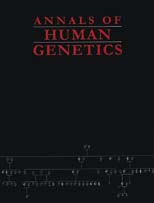Article contents
DNA haplotypes of the complement C6 and C7 genes associated with deficiencies of the seventh component; and a new DNA polymorphism in C7 exon 13
Published online by Cambridge University Press: 01 July 1997
Abstract
Eight common DNA polymorphisms have been described for the linked C6 and C7 genes. We now describe a ninth polymorphism in C7 exon 13 which is located in a tight cluster with two previously reported markers. We have used all these markers to investigate the heterogeneity of C7 deficiency. Five of the nine C7 deficient probands (resident in Ireland, South Africa, Russia and Israel) are heterozygous for C6/C7 haplotypes. Seven different C7 deficient haplotypes were found for C7 markers alone, but all the four Israelis share one and three out of four Irish haplotypes share another. The markers appear to be a good guide to the heterogeneity of C7 deficiency and have been useful in choosing homozygous subjects for the investigation of molecular defects.
- Type
- Research Article
- Information
- Copyright
- © University College London 1997
- 8
- Cited by




